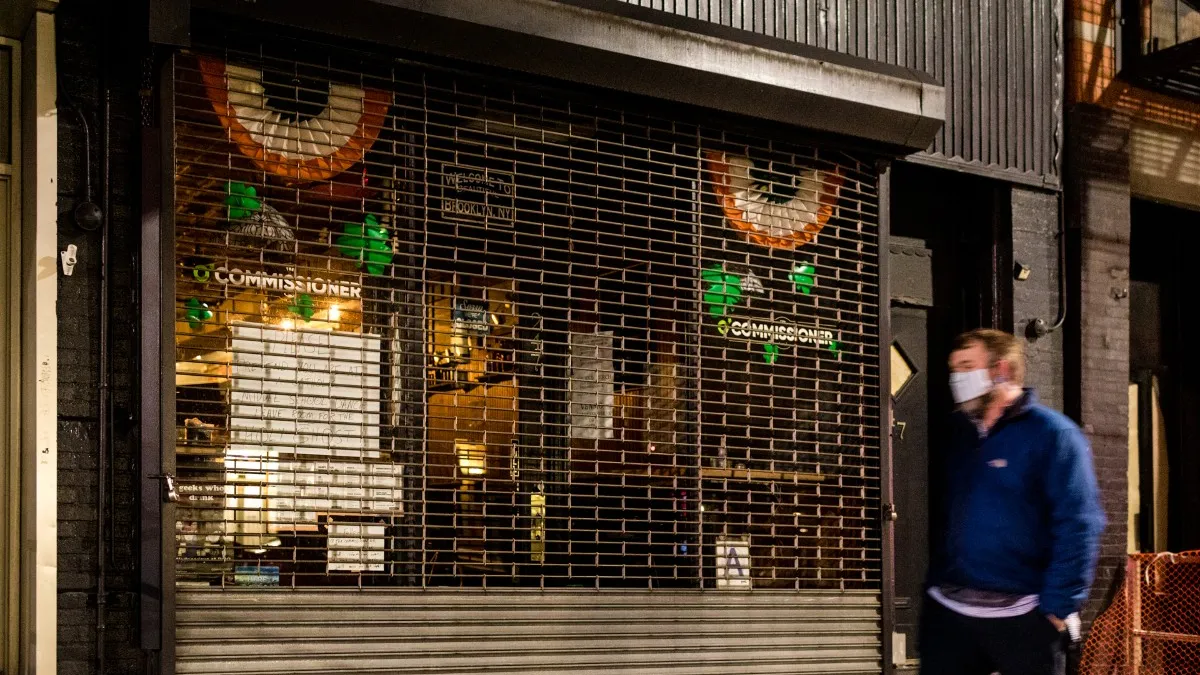UPDATE: Sept. 14, 2020: This article has been updated with comments from California Restaurant Association President and CEO Jot Condie.
Dive Brief:
- California Gov. Gavin Newsom signed three bills into law Wednesday designed to support small businesses struggling with the economic impact of the coronavirus pandemic. One initiative allows small businesses to exclude Payment Protection Program loans from gross income for state taxes, and another gives businesses that employ fewer than 100 workers and have seen a gross income decline of at least 50% a $1,000 income-tax credit for each employee hired up to $100,000.
- The third piece of legislation will provide the state with $411.5 million in stimulus funds, and $230.5 million of this fund will "jumpstart construction projects."
- The Golden State's initiatives come as struggles to settle on a federal coronavirus stimulus package continue to stretch on in Congress. It also follows Newsom's recent decision to allow select counties to reopen dining rooms at reduced capacity after ordering them to reclose on July 13 for the second time since the start of the pandemic.
Dive Insight:
California's new small business initiatives could be a salve for state restaurants, 30% of which were predicted to shutter permanently at the start of the pandemic, the California Restaurant Association reports. On Aug. 28, the association shared survey results where 60% of restaurant respondents that had received PPP loans said their funds would run dry by the end of August and 76% said they need rent relief.
The association previously called for state aid tailored to these businesses, citing that 41% said that a 50% capacity limit is needed to keep their operations viable. But the association feels that because these initiatives are designed for small businesses overall and not restaurants specifically, local operators will continue to struggle.
“Neither one of these measures even comes close to saving California restaurants. They both fail to target aid directly at California restaurants, who make up the industry most severely impacted by the pandemic," California Restaurant Association President and CEO Jot Condie said in an emailed statement. “The relief on a state tax liability for forgiven loans is, frankly, just common sense. While it’s something to be grateful for, it’s not something that should require so much effort or come with so much fanfare. It’s regrettable that it took so long for California officials to realize that it’s just not fair to tax small businesses on a federal loan that is a forgiven loan.”
Condie added that California's hiring tax credits "wrongly assumes" that state restaurants are hiring, but this isn't the case because most dining rooms remain closed. At the beginning of September, California allowed select counties to reopen their dining rooms after shutting down all indoor dining in mid July following rising COVID-19 cases. According to CRA, 14 counties are currently allowed to open at 25% capacity or 100 people per Newsom's new guidelines (but San Francisco and Santa Clara counties still prohibit indoor dining) and 10 counties can open at 50% or 200 people. This means that restaurants in 36 of California's 58 counties are currently not allowed to seat guests for dine-in service.
"That’s to say nothing of the fact that these tax credits are distributed on a first-come, first-served basis, which means they’re designed to help industries that are open, operating, and in a position to hire. These dollars will be of little benefit to restaurants and do little to incentivize rehiring of hundreds of thousands of out-of-work restaurant employees in California," Condie said.
Though these stimulus initiatives are not tailored to California restaurants specifically, they certainly fall under the umbrella of these new measures and can benefit from them. The question is how much time these benefits will buy local restaurants, especially as the staggering amount of wildfires on the West Coast pollute the air quality of several counties and disrupt outdoor dining, and as consumer confidence in restaurant safety could be undermined by new CDC findings that link dining out with increased risk of COVID-19 infection.












